
Stella Artois is a pilsner beer, first brewed in 1926 by Brouwerij Artois in Leuven, Belgium. In its original form, the beer is 5.2 per cent ABV, the country's standard for pilsners. The beer is also sold in other countries including the UK, Ireland, Canada and Australia, where it has a reduced ABV. Stella Artois is owned by Interbrew International B.V. which is a subsidiary of the world's largest brewer, Anheuser-Busch InBev SA/NV.
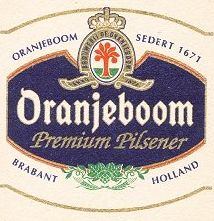
The Oranjeboom Brewery was founded in Rotterdam in 1671. The brewery there closed in 1990, with production shifted to Breda. That brewery was sold to Interbrew in 1995 and was closed in 2004 by InBev, Interbrew's successor. Production of the brand Oranjeboom was moved to the Dommelsch brewery. In October 2013, Oranjeboom was relaunched as a "quirky" new European style lager.

Duvel Moortgat Brewery is a Flemish family-controlled brewery founded in 1871 in Antwerp Province, Belgium. Its strong golden pale ale, Duvel, is exported to more than forty countries. Duvel is Brabantian, Ghent and Antwerp dialect for devil, the standard Dutch word being duivel. Other popular beers include Maredsous and Vedett.

Westmalle Brewery is a Trappist brewery in the Westmalle Abbey, Belgium. It produces three beers, designated as Trappist beer by the International Trappist Association. Westmalle Tripel is credited with being the first golden strong pale ale to use the term Tripel.

Beer in Belgium includes pale ales, lambics, Flemish red ales, sour brown ales, strong ales and stouts. In 2018, there were 304 active breweries in Belgium, including international companies, such as AB InBev, and traditional breweries including Trappist monasteries. On average, Belgians drink 68 litres of beer each year, down from around 200 each year in 1900. Most beers are bought or served in bottles, rather than cans, and almost every beer has its own branded, sometimes uniquely shaped, glass. In 2016, UNESCO inscribed Belgian beer culture on their list of the intangible cultural heritage of humanity.

Beer in the Netherlands mostly comprises pale lagers like Heineken and Grolsch. Heineken is the world's second-largest brewer.
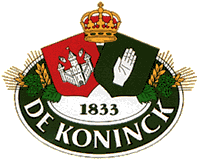
De Koninck Brewery (Brouwerij De Koninck) is a Belgian brewery founded in 1833 and based in Antwerp. The glass in which De Koninck's flagship beer is served is called a bolleke, although this term is most colloquially used to refer to a glass filled with the beer itself and is the way the beer is ordered in bars.
Amstel Brewery is a Dutch brewery founded in 1870 on the Mauritskade in Amsterdam. It was taken over by Heineken International in 1968, and the brewing plant closed down in 1982, with production moving to the main Heineken plant at Zoeterwoude.
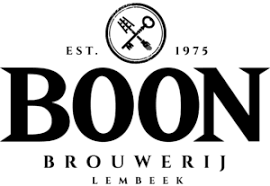
Boon Brewery is a Belgian brewery in Lembeek, near Brussels, that mainly produces geuze and kriek beer of a fairly traditional lambic variety, but using modern brewing techniques and equipment. Other products of the brewery including Faro beer and Duivelsbier, the traditional beer of Halle.
The High Council for Artisanal Lambic Beers is a non-profit organisation that brings together the gueuze brewers and blenders of the Pajottenland and Zenne Valley in Belgium.

Pierre Celis was a Belgian brewer who opened his first brewery in 1966 to revive the wit beer style in his hometown of Hoegaarden.
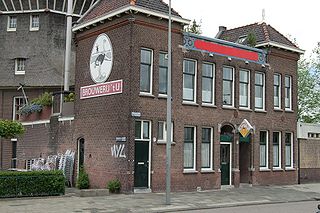
Brouwerij 't IJ is a small brewery in Amsterdam, Netherlands. It is located in a former bath house named Funen, next to the De Gooyer windmill. The brewery was opened by Kaspar Peterson, a former musician, in October 1985 and was one of several small breweries that opened in cities around the Netherlands in response to consumers' dissatisfaction with beer brewed by the larger companies. It brews twelve standard beers and three seasonal beers, besides limited edition beers.
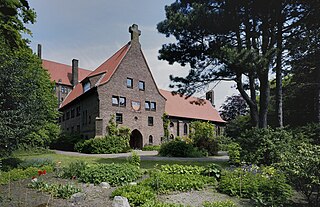
Egmond Abbey or St. Adalbert's Abbey is a Benedictine monastery of the Congregation of the Annunciation, situated in Egmond-Binnen, in the municipality of Bergen, in the Dutch province of North Holland. Founded in 920-925, and destroyed during the Reformation, it was re-founded in 1935 as the present Sint-Adelbertabdij, in the Diocese of Haarlem.
Hoegaarden Brewery is a brewery in Hoegaarden, Belgium, and the producer of a witbier, which is different from a wheat beer. Hoegaarden de-emphasizes hops, and is unfiltered, giving it the hazy, or milky, appearance--which makes it a wit (white) beer.
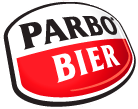
Surinaamse Brouwerij is the primary beer producer in Suriname. The brewery produces Parbo Bier and Parbo Power Stout.

Malheur Brewery is a brewery in Buggenhout, Belgium, formerly named De Landtsheer. It is known for its Malheur brew.
The Budelse Brouwerij is a Dutch brewery in Budel, North Brabant.

Den Tseut is a craft brewery located in the Belgian village of Oosteeklo. The brewery was founded in 2007 by Stefan De Decker and Ria Danneels.
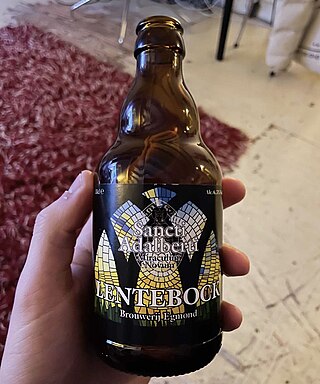
Brouwerij Egmond, also known as Sancti Adalberti is a Dutch brewery in Egmond aan den Hoef that is connected to the local St Adelbert's Abbey. The brewery brews abbey beer: part of the profits goes to the abbey.
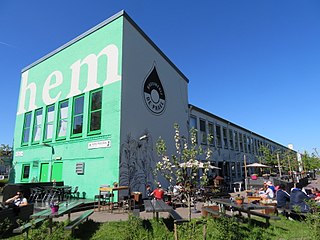
Brouwerij de Prael is a Dutch brewery in Amsterdam. The brewery is a member of CRAFT.